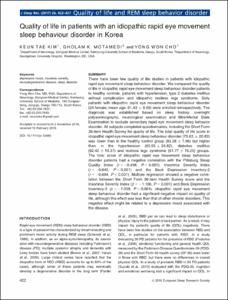Quality of life in patients with an idiopathic rapid eye movement sleep behaviour disorder in Korea
- Keimyung Author(s)
- Cho, Yong Won; Kim, Keun Tae
- Department
- Dept. of Neurology (신경과학)
- Journal Title
- Journal of Sleep Research
- Issued Date
- 2017
- Volume
- 26
- Issue
- 4
- Abstract
- There have been few quality of life studies in patients with idiopathic rapid eye movement sleep behaviour disorder. We compared the quality of life in idiopathic rapid eye movement sleep behaviour disorder patients to healthy controls, patients with hypertension, type 2 diabetes mellitus without complication and idiopathic restless legs syndrome. Sixty patients with idiopathic rapid eye movement sleep behaviour disorder (24 female; mean age: 61.43 ± 8.99) were enrolled retrospectively. The diagnosis was established based on sleep history, overnight polysomnography, neurological examination and Mini-Mental State Examination to exclude secondary rapid eye movement sleep behavior disorder. All subjects completed questionnaires, including the Short Form 36-item Health Survey for quality of life. The total quality of life score in idiopathic rapid eye movement sleep behaviour disorder (70.63 ± 20.83) was lower than in the healthy control group (83.38 ± 7.96) but higher than in the hypertension (60.55 ± 24.82), diabetes mellitus (62.42 ± 19.37) and restless legs syndrome (61.77 ± 19.25) groups. The total score of idiopathic rapid eye movement sleep behaviour disorder patients had a negative correlation with the Pittsburg Sleep Quality Index (r = -0.498, P < 0.001), Insomnia Severity Index (r = -0.645, P < 0.001) and the Beck Depression Inventory-2 (r = -0.694, P < 0.001). Multiple regression showed a negative correlation between the Short Form 36-item Health Survey score and the Insomnia Severity Index (β = -1.100, P = 0.001) and Beck Depression Inventory-2 (β = -1.038, P < 0.001). idiopathic rapid eye movement sleep behaviour disorder had a significant negative impact on quality of life, although this effect was less than that of other chronic disorders. This negative effect might be related to a depressive mood associated with the disease.
- Publisher
- School of Medicine (의과대학)
- Citation
- (2017). Quality of life in patients with an idiopathic rapid eye movement sleep behaviour disorder in Korea. Journal of Sleep Research, 26(4), 422–427. doi: 10.1111/jsr.12486
- Type
- Article
- ISSN
- 0962-1105
- Appears in Collections:
- 1. School of Medicine (의과대학) > Dept. of Neurology (신경과학)
- 파일 목록
-
-
Download
 oak-2018-0912.pdf
기타 데이터 / 108.75 kB / Adobe PDF
oak-2018-0912.pdf
기타 데이터 / 108.75 kB / Adobe PDF
-
Items in Repository are protected by copyright, with all rights reserved, unless otherwise indicated.